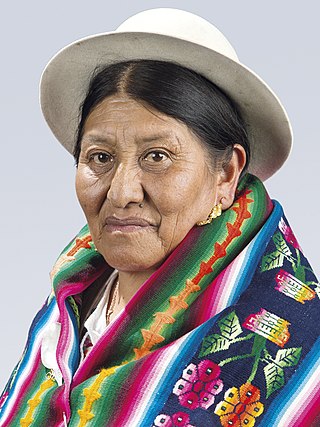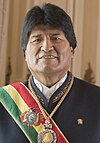
The politics of Bolivia takes place in a framework of a presidential representative democratic republic,whereby the president is head of state,head of government and head of a diverse multi-party system. Executive power is exercised by the government. Legislative power is vested in both the government and the two chambers of parliament. Both the Judiciary and the electoral branch are independent of the executive and the legislature. After the 2014 Bolivian general election,53.1% of the seats in national parliament were held by women,a higher proportion of women than that of the population.

Gregoria Apaza was an Indigenous leader in Bolivia. In 1781,she participated with her brother Julian Apaza and sister-in-law Bartolina Sisa in a major Indigenous revolt against Spanish colonial rule in Bolivia. These Aymara leaders laid siege to the cities of La Paz and Sorata before being defeated and executed in 1782.

Bartolina Sisa Vargas was an Aymaran woman and indigenous heroine who led numerous revolts against the Spanish rule in Charcas,then part of the Viceroyalty of Peru and present-day Bolivia. Alongside her husband,the indigenous leader Túpac Katari,she participated in the organisation of indigenous military camps that took part in the siege of La Paz. She was betrayed and turned in to the Spanish authorities,who later executed her.

Council of Ministers of Bolivia,or Cabinet of Bolivia,is part of the executive branch of the Bolivian government,consisting of the heads of the variable number of government ministries. The Council of Ministers are ministers of state and conduct the day-to-day business of public administration within Bolivia. The President of Bolivia may freely reorganize the executive branch,with the most recent comprehensive reorganization occurring in February 2009. Since then,the Ministry for the Legal Defense of the State has become the independent office of Solicitor General,and the Ministry of Communication has been created.
The Pact of Unity is an evolving national alliance of Bolivian grassroots organizations in support of indigenous and agrarian rights,land reform,the rewriting of the 1967 constitution through a Constituent Assembly,and a left-indigenous transformation of the Bolivian state. Since 2005,the Pact has been a close ally of Bolivian President Evo Morales,and it forms the nucleus of the National Coordination for Change,a pro-government alliance.
The Bartolina Sisa National Confederation of Campesino,Indigenous,and Native Women of Bolivia is the primary union organization of peasant women in Bolivia,and the women's organization with the largest membership in the country. The organization was founded as the Bartolina Sisa National Federation of Peasant Women of Bolivia in January 1980,shortly after the 1979 protests against the de facto presidency of Colonel Alberto Natuschfounding and the founding of the Unified Syndical Confederation of Rural Workers of Bolivia (CSUTCB). The founding members were Lucila Mejía de Morales,Irma García,Isabel Juaniquina and Isabel Ortega. The name Bartolina Sisa refers to the Aymara peasant leader of the 18th century,the wife of Túpac Katari,and reflects the strong influence of the Katarista movement in peasant politics. The current name was adopted in the organization's Organic Congress of 29–30 November 2008,redefining the organization as a confederation and adopting the phrase Campesino,Indigenous,and Native from the text of the new Bolivian constitution. Their main aims are to organize and facilitate women's participation in national terrain. They achieve these aims by giving indigenous women political,economic,cultural,and social decision making power;unifying peasant women's political,cultural,and social rights under a single framework;and promoting economic development on the basis of traditional peasant Indigenous peoples’knowledge. Through this work their ultimate mission is the decolonization of women and encouragement of their equal and meaningful participation in protest. The Bartolina Sisa Confederation is a member of the Pact of Unity in Bolivia,and of the National Coordination for Change,and a constituent organization in the Movement toward Socialism party. The president of the Constituent Assembly in Bolivia,Silvia Lazarte,was elected Executive Secretary at the National level at the 8th national congress in April 1999.
Damián Condori Herrera is a Bolivian peasant leader,politician,and Governor of Chuquisaca Department since 3 May 2021. Condori served as executive secretary of the Unified Syndical Confederation of Rural Workers of Bolivia (CSUTCB),Bolivia's largest peasant union. Condori first ran for governor of Chuquisaca in 2015,finishing second and failing to qualify for a runoff under a controversial electoral court ruling. He is the co-founder of We Are All Bolivia,a party founded on 21 April 2016,by dissident former members of the Movement for Socialism–Political Instrument for the Sovereignty of the Peoples (MAS-IPSP). He was spent two years in pre-trial detention as part of the investigation into the Indigenous Fund corruption scandal from 2015 to 2017. In the 2021 election for governor,Condori won a plurality in the first round and defeated MAS-IPSP candidate Juan Carlos León in the runoff.
Julia Damiana Ramos Sánchez is a Bolivian nurse and politician. She was a Plurinational deputy from 2006 to 2009,and Minister of Land and Rural Development from 2009 to 2010,during the first government of Evo Morales.
Tomasa Yarhui Jacomé is a Bolivian lawyer and politician. She became the country's first indigenous government minister when she occupied the portfolio of Peasant Affairs and Indigenous Peoples during the government of President Jorge Quiroga on 5 March 2002.
Mariana Prado Noya is a Bolivian business administrator and politician. She served as the Minister of Development Planning from 2017 to 2019,during the third government of Evo Morales.

Rafael Arcángel Quispe Flores,often referred to as Tata Quispe,is a Bolivian indigenous activist and politician who served as general executive director of the Indigenous Development Fund from 2019 to 2020. He previously served as a substitute party-list member of the Chamber of Deputies from La Paz under María Eugenia Calcina from 2015 to 2019.

Sabina Orellana Cruz is a Bolivian unionist and politician of Quechua origin who served as Minister of Cultures,Decolonization and Depatriarchalization under President Luis Arce from 2020-2024. She is a member of the Bartolina Sisa Confederation of indigenous women.

The Arce Cabinet constitutes the 222nd cabinet of the Plurinational State of Bolivia. It was formed on 9 November 2020,one day after Luis Arce was sworn in as the 67th president of Bolivia following the 2020 general election,succeeding the Áñez Cabinet. The cabinet is composed entirely of members of the ruling Movement for Socialism. Described as a "technocratic" cabinet,it has been noted for the low-profile and youth of some of its members as well as its political distance from former president Evo Morales.

Ana Teresa Morales Olivera is a Bolivian economist,professor,and politician. She was the Minister of Productive Development and Plural Economy of Bolivia from 23 January 2011,to 23 January 2015,during the second government of President Evo Morales Ayma.

Martha Yujra Apaza is a Bolivian politician and trade unionist who served as minister of cultures and tourism from 2019 to 2020. A prominent trade union leader in El Alto,Yujra was the only indigenous member of the Jeanine Áñez Cabinet and was the final official to head the Ministry of Cultures and Tourism;the institution was abolished during her term. During her tenure,Yujra's office primarily dealt with the effects of the COVID-19 pandemic on the cultural sector,devising means of alleviating the economic ramifications of quarantine measures on artisans and entertainers. She subsequently served as a counselor at the Embassy of Bolivia in Quito from July to November 2020. Prior to serving as minister,Yujra gained notoriety for her fierce opposition to the government of Evo Morales. In 2017,she led a breakaway faction of the pro-government El Alto Regional Workers' Center. As its executive secretary,Yujra aligned the union with the Bolivia Says No alliance,running unsuccessfully to represent La Paz in the Chamber of Deputies in the annulled 2019 general elections.

Lidia Patty Mullisaca is a Bolivian politician and trade unionist. A member of the Movement for Socialism,Patty represented La Paz in the Chamber of Deputies,first as a substitute alongside Manuel Canelas from 2015 to 2018 and later as a voting member until 2020. She later served as consul of Bolivia to Puno,Peru,in June 2023 and has been vice consul of Bolivia in La Plata,Argentina,since September 2023.

Ancelma Perlacios Peralta is a Bolivian cocalera activist,politician,and trade unionist who served as senator for La Paz from 2015 to 2020.

Plácida Espinoza Mamani is a Bolivian educator,politician,and trade unionist who served as senator for Oruro from 2015 to 2020.

Julia Figueredo Paniagua is a Bolivian agricultural worker,politician,and trade unionist who served as a party-list member of the Chamber of Deputies from La Paz from 2010 to 2015.

Patricia Mancilla Martínez is a Bolivian politician and trade unionist who served as a party-list member of the Chamber of Deputies from La Paz from 2010 to 2015. A member of the Movement for Socialism,she previously served on the Cairoma Municipal Council from 2000 to 2005.














